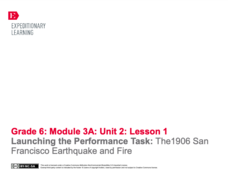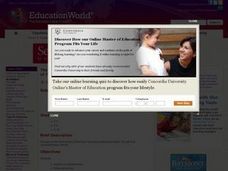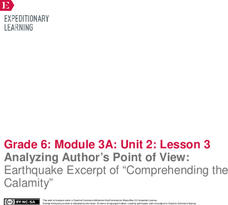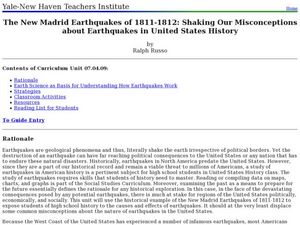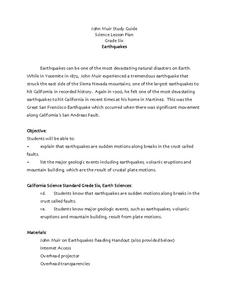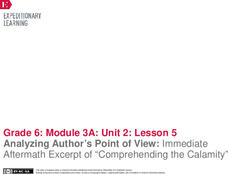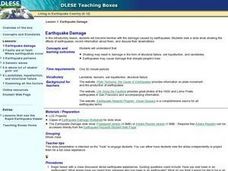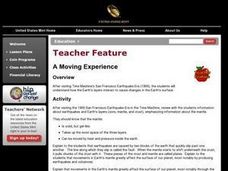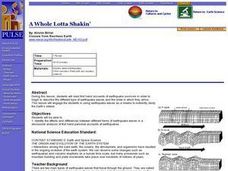EngageNY
Launching the Performance Task: The1906 San Francisco Earthquake and Fire
Picture that! Pupils view photographs of the aftermath of the 1906 San Francisco earthquake and fire, discussing what they know and wonder about each image. Then, scholars watch a short video about the historic event and complete a KWL...
Curated OER
The San Francisco Earthquake of 1906
Students study the history of the 1906 San Francisco earthquake. They read a story, view photos of the disaster, and complete a comprehension worksheet.
Curated OER
Photographs of the 1906 San Francisco Earthquake
Fourth graders study the details of the 1906 San Francisco earthquake including the fires that lasted for three days. They participate in discussion describing what they feel the city looked like after the earthquake and fires. They...
EngageNY
Mid-Unit 3 Assessment Part 1: Researching the Destruction Caused by the 1906 San Francisco Earthquake and Fires
How do you interpret that? Scholars work on their mid-unit assessments by interpreting resources pertaining to the 1906 San
Francisco Earthquake and Fires. Readers use the text in their research folders and complete graphic organizers,...
Curated OER
1906 San Francisco Earthquake
Students analyze photographs relating to the 1906 San Francisco earthquake for earthquake damage. They determine the cause and effects of the earthquake and the fire.
Curated OER
Social Studies: San Francisco Earthquake
Young scholars discover details about the San Francisco earthquake of 1906. In this natural disaster lesson, students visit selected websites to analyze primary sources related to the personal accounts of the earthquake. Young scholars...
EngageNY
Introducing “Comprehending the Calamity”
Some things are beyond comprehension. Scholars read an excerpt from "Comprehending the Calamity," a primary source text about the 1906 San Francisco earthquake. After identifying the gist, pupils complete anchor charts to analyze how the...
EngageNY
Analyzing Author’s Point of View: Earthquake Excerpt of “Comprehending the Calamity”
How do authors convey their points of view? Using the resource, scholars read an excerpt from a primary source document about the 1906 San Francisco earthquake. Then, they complete graphic organizers to analyze the author's point of view.
Curated OER
Examing the San Francisco Earthquake
Students analyze photographic data about the San Francisco earthquake for evidence of its cause and effect. they determine if damage was caused by the earthquake itself or the ensuing fire. They role-play as earthquake survivors and...
EngageNY
Finding the Gist of the Immediate Aftermath: Excerpt of “Comprehending the Calamity”
Brace for the aftershocks! Scholars read an excerpt from a primary source document about the immediate aftermath of the 1906 San Francisco fire and earthquake. Next, pupils complete an anchor chart, analyzing how the author introduces,...
Curated OER
Using Primary Documents: The 1906 San Francisco Earthquake
Learners examine primary documents from various key historical events, including those from the 1906 San Francisco earthquake. They discuss the importance of such documents.
Curated OER
The New Madrid Earthquakes of 1811-1812: Shaking Our Misconceptions about Earthquakes in United States History
Students Examine how earthquakes work and what plate tectonics and fault lines are. In this earthquake lesson students complete an earthquake scavenger hunt.
EngageNY
Mid-Unit 3 Assessment Part 2: Explaining How New Information Connects to the Topic
Take two! Scholars begin part two of the Mid-Unit 3 Assessment. They continue researching the destruction caused by the 1906
San Francisco earthquake and fires. To further their research, they discuss how new information connects to the...
EngageNY
Researching Facts
How did the 1906 San Francisco earthquake and fire affect the city's inhabitants? Scholars embark on a quest to discover the answer as they work in small groups to research articles about the event. They finish by completing a jigsaw...
Curated OER
Earthquakes
Sixth graders explain that earthquakes are sudden motions along breaks in the crust called faults. They list the major geologic events including earthquakes, volcanic eruptions and mountain building, which are the result of crustal plate...
Curated OER
Earthquakes
Sixth graders explore reasons for earthquakes. They discuss and describe the types of faults. Using the internet, 6th graders research a specific location of a former earthquake. They describe the damage, magnitude, the epicenter,...
EngageNY
Analyzing Author’s Point of View: Immediate Aftermath Excerpt of “Comprehending the Calamity"
Analyze that! Scholars continue reading and analyzing a primary source about the immediate aftermath of the 1906 San Francisco fire and earthquake. Then, individuals use graphic organizers to identify the author's point of view.
Curated OER
Earthquake Damage
Students identify that shaking may result in damage in the form of structural failure, soil liquefaction, and landslides. They also identify that earthquakes can cause damage that disrupts people's lives. Finally, students view a...
Curated OER
A Moving Experience
Students visit Time Machine's San Francisco Earthquake Era. They understand how the Earth's layers interact to cause changes in the Earth's surface. They review information about earthquakes and Earth's layers.
Curated OER
1906 Earthquake
Pupils explore the impact of the 1906 earthquake on the population of San Jose. They explore two different perspectives of earthquakes. Students write a news bulletin as if they were reporting on the earthquake. They are then divided...
Curated OER
A Disaster in the Making
Students compare the consequences of the 1906 earthquake in San Francisco to Hurricane Katrina's impact on New Orleans as a basis for investigating the transformative effect of infamous United States natural disasters.
Curated OER
Quake Clues
Students study earthquakes and how sediment accumulations are used for past information on earthquakes. For this earthquake lesson students interpret sediment cores and describe turbidites.
Curated OER
A Whole Lotta Shakin'
Students read first hand accounts of earthquake survivors in order to begin the describe the different types of earthquake waves and the order in which they arrive. They engage in using earthquake waves as a means to indirectly study the...
Curated OER
Dangerous Earth
Middle schoolers view a Dangerous Earth video and research a historic or recent earthquake. In this earthquake lesson students create a piece of are to portray the experience of their particular earthquake.


